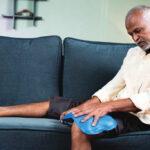(Reuters Health)—Obese people with knee osteoarthritis (OA) may find greater symptom relief when they lose larger amounts of weight, a recent study suggests.
Researchers examined data on 240 obese adults with pain from knee OA who were participating in an 18-month experiment to see how diet alone or diet plus exercise affected their health.
Participants who lost 10% or more of their baseline body weight by the end of the study experienced a 50% reduction in pain and also reported significant improvements in mobility and daily function.
But more weight loss was even better. People who lost at least 20% of their baseline weight experienced 25% less pain and better daily function than patients who lost no more than 10% of their weight, the authors report June 18 online in Arthritis Care & Research.1
“Our previous work has shown that when combined with mild to moderate exercise, a 5% weight loss over 18 months reduces pain by 25% and improves function and mobility compared to a control group,” says lead study author Stephen Messier of Wake Forest University in Winston-Salem, N.C.
“Twice that weight loss to 10% essentially has twice the effect,” Messier says by email. “Our new study indicates that for people who achieve a 10% weight loss and would like to continue losing more weight safely, they will see additional benefits in improved health-related quality of life, and reduced pain and improved function.”
The current study also looked at results from six-minute walking tests and found more weight loss associated with longer distances in the test. Patients had some improvement in walking distance when they lost just 5% of their weight, but results were much more dramatic with a 10% or 20% weight loss.
One limitation of the study is that it doesn’t show long-term effects of weight loss on knee joint pain or mobility, or show whether people are able to maintain weight loss over time or if they regain weight. It also wasn’t a controlled experiment designed to prove how the magnitude of weight loss might directly influence reductions in pain or improvements in mobility.
In addition to reducing the biomechanical strain on the knee joint, weight loss may also help curb pain from knee osteoarthritis by decreasing inflammation, says Dr. C. Kent Kwoh, director of the University of Arizona Arthritis Center, Tucson.
“The simple message is that some weight loss is good, even just 10%, and more weight loss is even better for all these important parameters of symptoms, function, joint load and systemic inflammation,” Kwoh, who wasn’t involved in the study, says by email.

